We’ve been on the road out selling books – just last week at a camp hosting a wonderful annual conference for small Presbyterian congregations. We helped host photographer and social entrepreneur Jeremy Cowart at our church, selling his book I’m Possible: Jumping Into Fear and Discovering a Life of Purpose. Soon, we serve a Lutheran preaching workshop with Paul Scott Wilson and then head to a speaking engagement out at Grove City College, even as we’re prepping for the national Christian Legal Society annual gathering coming up soon in Chicago. Thanks for your prayers and for sending us orders which sustains our bookish ministry.
 As you may have seen at our Facebook group, we have author Shawn Smucker coming to the store on Saturday night, October 19th. Shawn has written two YA fantasy novels (which, like the best YA novels, are good for adults, too), a mysterious adult novel called The Light from Distant Stars and a moving memoir about meeting a Syrian refugee and what that taught him about “loving my neighbor.” It starts at 7:00 pm and will be a great time to hear an accomplished writer read from his books and talk about his stories and his craft. All are welcome.
As you may have seen at our Facebook group, we have author Shawn Smucker coming to the store on Saturday night, October 19th. Shawn has written two YA fantasy novels (which, like the best YA novels, are good for adults, too), a mysterious adult novel called The Light from Distant Stars and a moving memoir about meeting a Syrian refugee and what that taught him about “loving my neighbor.” It starts at 7:00 pm and will be a great time to hear an accomplished writer read from his books and talk about his stories and his craft. All are welcome.
In the last BookNotes I announced that we had just gotten in, that day, brand new books by Jim Wallis (Christ in Crisis) and Jeremy Courtney (Love Anyway.) I told you that these are two authors we respect and whose books are surely worth reading, even if may not agree with everything said or implied. Jim is an old friend who founded the underground Post American that became Sojourners; Jeremy wrote the breathtaking Preemptive Love about doing medical missions and building interfaith friendships and peacemaking coalitions in the Middle East, showing how the power of love can help enemies unite around saving kids lives. If the old ’60s student radical turned evangelical peace and justice advocate Wallis represents an older school of progressive faith leader, Jeremy is a Gen X social entrepreneur/activist who is on the ground with skin in the game, right now. I had skimmed both of these books quickly for an hour and sent my BookNotes accolades into the ether just like that.
Over the next week I read them both. I now want to weigh in to assure you that they are as good as I had predicted and that I believe many of our Hearts & Minds customers should read them. Each in their own way they are exceptionally current and very important.
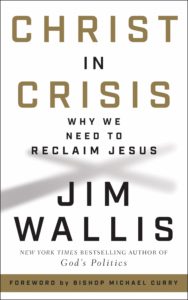 Christ in Crisis: Why We Need to Reclaim Jesus Jim Wallis (HarperOne) $25.99 OUR BOOKNOTES SALE PRICE = $20.79
Christ in Crisis: Why We Need to Reclaim Jesus Jim Wallis (HarperOne) $25.99 OUR BOOKNOTES SALE PRICE = $20.79
As I said in the previous newsletter announcement, Christ in Crisis is what Jim suggests may be his most important book yet, certainly one that focuses on our civic polarization and political crisis through the lens of questions that Jesus asks, reminding us of some pretty basic things, Biblical truths too often forgotten or ignored. Like the earliest days of Sojourners, Wallis calls us to conversion, to turn from our idols and from accommodation and complicity in worldly injustices and the abuse of power.
And he talks about baseball. About his family. And draws on a lifetime of fascinating stories working with the urban poor while traveling around the globe encouraging faith-based activism for peace and justice, equality and reconciliation.
I’m not going to lie: I’ve read every book Jim has written (even though I may wish he’d adopt a different tack or tone here or there) and have written and taught and preached most of this same stuff myself over the years. I was glad for a book on Jesus and the political implications of His reign, but wasn’t expecting to be so moved; I’ve been there, done that, I figured. As I told one group last week, I started the book assuming it would be fine but mostly a rehash of stuff I knew, and to my delight, my heart was strangely warmed with each consecutive chapter. Yes, much of this is like a Sojo greatest hits album, but framed by these significant questions raised by Christ in the gospels, reading it became a deeply moving experience for me, and each chapter got better and better. Like a socially consequential but almost old-fashioned altar call, Wallis invites us to grapple with the Biblical truth of who Jesus is and what it means to be shaped by His ways. Who doesn’t need that renewal and revival from time to time?
 The subtitle “Why We Need to Reclaim Jesus” is a directly jab, of course, at the Christian right. Those who want to be faithful in the ways of Jesus need to counter the way the media and the fundamentalist right has co-opted the lingo of evangelicalism without much obvious commitment to Christ’s teachings. Good people can disagree about the application of the Sermon on the Mount mandates and we should admit that a Christ-like social ethic (let alone public policy) can be complicated. Wallis is a preacher, not a politician, but he knows a bit about the policy debates, so his direction in political Christ-likeness isn’t cheap rhetoric. Granted it’s not Jamie Smith’s Awaiting the King on political theology or James Skillen on the task of the state (as in his The Good of Politics) but it is really, really good Bible stuff that somehow we too often miss in thinking about the relevance of our faith for our civic lives.
The subtitle “Why We Need to Reclaim Jesus” is a directly jab, of course, at the Christian right. Those who want to be faithful in the ways of Jesus need to counter the way the media and the fundamentalist right has co-opted the lingo of evangelicalism without much obvious commitment to Christ’s teachings. Good people can disagree about the application of the Sermon on the Mount mandates and we should admit that a Christ-like social ethic (let alone public policy) can be complicated. Wallis is a preacher, not a politician, but he knows a bit about the policy debates, so his direction in political Christ-likeness isn’t cheap rhetoric. Granted it’s not Jamie Smith’s Awaiting the King on political theology or James Skillen on the task of the state (as in his The Good of Politics) but it is really, really good Bible stuff that somehow we too often miss in thinking about the relevance of our faith for our civic lives.
As well-known black preacher Otis Moss III puts it,
American yearns for an appropriate reintroduction to the person named Jesus. Jesus has been hidden by shallow religion and dishonest commentary. Jim Wallis reclaims and reintroduced us to a radical spiritual figure even nonbelievers will find inspiring.
Others, too, have summarized Jim’s new book nicely. Diana Butler Bass says it could be called Following Jesus Again for the First Time. Parker Palmer notes that “Some Christians believe Jesus is an advance man for ‘Make America Great Again,’ but for those who long to restore the church’s integrity… Wallis teaches us to struggle for love, truth, and justice while resisting the seductions of political power.”
Jim’s old friend Wesley Granberg-Michaelson, a respected, Reformed scholar, engaged leader of global Christianity, and author of books like Future Faith: Ten Challenges Reshaping Christianity in the 21st Century, notes that Wallis “calls us to de-Americanize the Gospel.”
Wes continues:
Take and read; these words will feed your heart, and if heeded, heal the soul of the nation. Wallis resurrects the spiritual wisdom and moral clarity so desperately needed to speak words of prophetic power, integrity and truth.
Brittany Packnett, a young black activist he tells about in the book (cofounder of Campaign Zero), notes that “For too long, we’ve ceded the power and person of Jesus to political movements with no ambitions toward His radical love.” I think this is too-often correct which I why I hope BookNotes readers from across the political spectrum will take up this book to at least consider and discuss and debate. You can read the “Reclaiming Jesus Declaration” here to get a feel for what inspired Wallis to write about these eight questions.
Watch this video of Jim talking passionately (if soberly) about this crisis of our culture, the crisis of faith, and why we have to recover the person and work and values of Jesus. (But be sure to come back to keep reading BookNotes — there’s a lot more you’ll want to see!)
Anyway, I shared in the last BookNotes just a bit about this new book so you knew it was out. Now that I’ve read it, I’m very eager to commend it, seriously so. As we announced last week, we have it at 20% off. You can use our secure order form page by clicking the “order here” tab below.
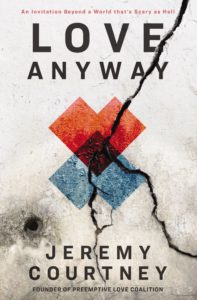 Love Anyway: An Invitation Beyond a World That’s Scary as Hell Jeremy Courtney (Zondervan) $17.99 OUR BOOKNOTES SALE PRICE = $14.39
Love Anyway: An Invitation Beyond a World That’s Scary as Hell Jeremy Courtney (Zondervan) $17.99 OUR BOOKNOTES SALE PRICE = $14.39
I’ve got the same need to tell you just a bit more about Jeremy Courtney’s latest book. Last week it had just come in and although we’ve met Jeremy a time or two and follow his brave work of offering relief and supplies to those in the war zones of Iraq and Syria, I was simply unprepared for the captivating read Love Anyway was. My heart raced as I heard my friend talk about unbelievable dangers, betrayals, persecutions. Those who read Preemptive Love will recall some painful relationship losses as Jeremy and Jessica and their children tried to earn the trust and solidarity with Shia and Sunni Muslims, Turkmen and Kurds, Jews and Christians and Zoroasters, radicals and revolutionaries. Part of the vision of their Preemptive Love organization is relational, trading in the arts of friendship, human-scale entrepreneurial start-ups, collaborative team-building and the like. He drinks a lot of Middle Eastern tea and strong sweet coffee with a lot of folks in a lot of villages.
As the Gulf wars raged and the US invaded Iraq and ISIS emerged and the horror deepened, Jess and Jeremy re-doubled their resolve to “overcome evil with good” and to be nonviolent agents of friendship and grace.This was new ground for them – for most of us – so they had to imagine and dream and experiment in building signposts towards the world they believed could break into human history. Despite grotesque barbarism – rape, genocide, chaos, hunger – they look for acts of kindness and celebrate beautiful things. They are artists of the impossible, it seems, conjuring dreams and visions few of us can hardly imagine and inviting others to join the movement of forgiveness and love.
 And they do it. They started a local soap-making project and helped form a candle-making business; they teach job skills as ways to bring income to a region, they work well with woman and help with child protection services, even as they arrange for emergency medical work. In the midst of severe crisis, they get semi-trucks loaded with healthy food into places no aid organizations dare go. (Backing out the huge trucks is another story!) This becomes a bit of a theme in some of the chapters – why aren’t the established, major relief organizations where they are so badly needed? The Preemptive Love Coalition is small and the need is great. Where are the big, well-known charitable groups? The answer may be one of organizational culture with the larger agencies mired in bureaucracy and politics and a clunky top-down organizational flow in contrast to Jeremy and Jess’s nimble, audacious style, guided by a Gen X metric of relationship and Christ-like idealism. So there they go, fearless it seems, right into the heart of violent, ISIS occupied Mosul, the only Western charitable organization on the ground.
And they do it. They started a local soap-making project and helped form a candle-making business; they teach job skills as ways to bring income to a region, they work well with woman and help with child protection services, even as they arrange for emergency medical work. In the midst of severe crisis, they get semi-trucks loaded with healthy food into places no aid organizations dare go. (Backing out the huge trucks is another story!) This becomes a bit of a theme in some of the chapters – why aren’t the established, major relief organizations where they are so badly needed? The Preemptive Love Coalition is small and the need is great. Where are the big, well-known charitable groups? The answer may be one of organizational culture with the larger agencies mired in bureaucracy and politics and a clunky top-down organizational flow in contrast to Jeremy and Jess’s nimble, audacious style, guided by a Gen X metric of relationship and Christ-like idealism. So there they go, fearless it seems, right into the heart of violent, ISIS occupied Mosul, the only Western charitable organization on the ground.
But I must tell you – and this is one of the reasons this book is a must-read for anyone who cares about global realities and visionary Christ-like ways of public service – it doesn’t always go well.
Yes, there are gloriously inspiring episodes in this book which is chock-full of good stories. Yes, Jeremy writes eloquently about the dream of the world God wants, a way we can hardly imagine but believe in our hearts is somehow possible. Yet, I am choked up, even now, trying to tell you, dear readers, how hard it was to read this painful book by our friend. He saw things perhaps few Westerners (other than our soldiers, some relief workers and missionaries, maybe) actually see. Except for the military (who in this book seem at times benign and helpful and other times threatening and brutalizing), most Westerners have not entered these danger zones or left when ISIS advanced. His journalistic reporting is always interesting as he talks about the food and terrain, sometimes mundane, and sometimes gripping, like when he is passing by the grave site of the executed Saddam Hussein, buried in his ancestral village, Al-Awja, about 100 miles north of Baghdad.
Sometimes, things get very ugly. With vile Chinese-made scatter bombs and fear-producing videos of beheadings and the demonic realities of mass rape, it is no wonder the world didn’t know what to do.
I am unclear about some of the time line of this memoir – it’s due to my bad memory and ignorance, not a fault of the book – but some of the harshest stories in Love Anyway are set when the Yazidis were surrounded at Sinjar and slaughtered in the summer and fall of 2014. My hunch is that Jeremy would say that President Obama’s foreign policy wasn’t helpful, but that President Trump’s has unleashed even more chaos on the ground. He never names any US political figures as that isn’t his focus; as oppression continues and air-strikes and drones from various sources do their damage, he clearly reports in a vivid, informative way, telling just what it is like in this place near Nineveh where ISIS black flags are spray painted on homes, the ubiquitous N (for Nazarene, or Christian) is a death-threat, and ancient churches with ancient manuscripts are bombed and burned. He’s an electrifying storyteller and most of us have read some of this stuff in the newspapers, but some of this, in his intimate telling, is still quite shocking.
And so, this is a book about a former evangelical missionary evolving in faith to become more inclusive and less evangelistic – having real friends who are Muslims or Sikhs or Kurds softened his self-righteous zeal to convert them (which damaged some of his old church-related friendships and hurt his Southern fundamentalist funding sources, another fraught  theme of the story.) Love Anyway offers a bit of a quick overview of some of what is told so dramatically in the earlier volume about arranging (cross-cultural and interfaith) pediatric heart surgeries, Preemptive Love: Pursuing Peace One Heart at a Time. In those early days in Iraq they adopted the motto “love first, ask questions later” in contrast to what they heard US military men and women say, famously, “shoot first, ask questions later” or “kill them all, let God sort ‘em out.” He is quick to admit that this isn’t US policy, of course, and his soldiering friends may or may not have actually endorsed these slogans of dark humor, but – as we know – this is part of the culture of military training and there have been gross abuses and civilian deaths in our waging war. Without sounding off in protest against the warriors (with whom he sometimes partners) The Preemptive Love Coalition tried to wage peace.
theme of the story.) Love Anyway offers a bit of a quick overview of some of what is told so dramatically in the earlier volume about arranging (cross-cultural and interfaith) pediatric heart surgeries, Preemptive Love: Pursuing Peace One Heart at a Time. In those early days in Iraq they adopted the motto “love first, ask questions later” in contrast to what they heard US military men and women say, famously, “shoot first, ask questions later” or “kill them all, let God sort ‘em out.” He is quick to admit that this isn’t US policy, of course, and his soldiering friends may or may not have actually endorsed these slogans of dark humor, but – as we know – this is part of the culture of military training and there have been gross abuses and civilian deaths in our waging war. Without sounding off in protest against the warriors (with whom he sometimes partners) The Preemptive Love Coalition tried to wage peace.
As much as I’ve studied this topic – social change through nonviolent resistance, peace-building, direct action, holistic development, community organizing for justice and the like – I have never read an account like this. I suspect you haven’t either. Love Anyway: An Invitation Beyond a World That’s Scary as Hell is one of the most captivating books I’ve read this year.
I do not want to spoil too much, as this really is an exciting read with some fascinating twists and turns, but there is a painful crisis of faith that reverberates just below the surface of much of this. It will strike many readers as understandable but sad. As the chapters unfold you can just feel the tension, the philosophical struggles, the draining setbacks, the frustrations, the loss. Some think he’s too focused on one thing or another, others criticize this or that; folks back home don’t approve of something, others disapprove of something else. Even his own colleagues and friends are troubled. He is haunted by the accusation that he is a bad husband and father for involving his family in this dangerous work. He experiences trauma leading to something akin to post-traumatic stress.
Jeremy and his wife and their dearest friends are performing a high-wire dance without a net, and when things get scary, they are too often not supported well (or so it seems to me.) Naturally, they wrestle. They have doubts about their evangelical faith. Does this love stuff even make sense? Is there a chance it can be effective? Are their interfaith cooperation efforts a quixotic dream better suited to progressive Christian conferences and podcasts about making a difference or can we really “be the change we want to see in the world”? Where is God? These are my words, not his, exactly, but this wonderfully-written report from the ground, written amidst power outages and water shortages and extremes of heat and cold and threats of arrest (rumors were spread that his organization was a front for the CIA) and not surprising relational issues and problems with donors back home are just riling with large 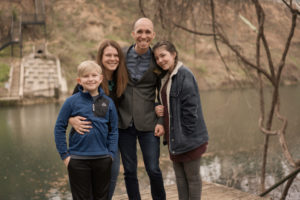 anxieties, despite truly great accomplishments. Most of us who have tried to innovate or start something or serve in hard places understand something of these quandaries, but this is like nearly anything I’ve ever read. I think you won’t be able to put it down. Your heart make ache a bit and you may want to pray harder for Jeremy and Jess and their children, Micah and Emma, and their friends and team-members. I hope so.
anxieties, despite truly great accomplishments. Most of us who have tried to innovate or start something or serve in hard places understand something of these quandaries, but this is like nearly anything I’ve ever read. I think you won’t be able to put it down. Your heart make ache a bit and you may want to pray harder for Jeremy and Jess and their children, Micah and Emma, and their friends and team-members. I hope so.
Check out their website here which nicely explains their efforts to “Help fast, to stop the spread of war” and to offer “help that lasts, which reduces the risk of war” and to “heal the past, which, by reaching across enemy lines and creating a diverse community, can change the ideas that lead to war.” With their friendship and relief aid they want to “unmake” violence. It’s a large-hearted vision and it takes a toll anywhere. Especially in this hard place. Jeremy and his publishers are to be honored for talking about it all so beautifully and yet so candidly.
Will you help us spread the world about Love Anyway? It would very meaningful for us to get to send some of these out, at our 20% off BookNotes sale price. Use the secure order link below and just tell us what you want and where to send your order. We’ll confirm everything personally, of course. Thanks.
+++
Now I have to do it again – tell you immediately about four brand new books that just arrived that I haven’t had time to read carefully yet. We’re on the run, balancing our own swirling plates, but we simply must give a quick shout out to these wonderful new titles. Read on!
 From Judgment to Hope: A Study on the Prophets Walter Brueggemann (WJK) $14.00 Walt may be aging a bit and he has largely retired from travel and speaking, I’m told, but he is as generative and productive as ever, doing new books, writing introductions, collating previous stuff into serviceable, inspiring, resources for God’s people. I know he isn’t the only one, but in many ways, Brueggemann has almost single-handedly inspired many (especially in mainline churches, at first, and now more widely) to recover the profundity of the counter-narrative of the Bible, the prophetic imagination, the subversive and transforming vision that offers an energetic faith-filled alternative to the dominant ideologies of the age. As he has said over and over (perhaps most clearly in his little The Bible Makes Sense) those on the cultural right and left have both tried to read the Bible within their own chosen proclivities and ideologies, and the texts simply won’t allow it. Any honest reading of the raw and wild poetry of the Scriptures simply must renew our assumptions and set us on a trajectory unlike the worldly options of left or right, religious or secular, the poles of freedom or control.
From Judgment to Hope: A Study on the Prophets Walter Brueggemann (WJK) $14.00 Walt may be aging a bit and he has largely retired from travel and speaking, I’m told, but he is as generative and productive as ever, doing new books, writing introductions, collating previous stuff into serviceable, inspiring, resources for God’s people. I know he isn’t the only one, but in many ways, Brueggemann has almost single-handedly inspired many (especially in mainline churches, at first, and now more widely) to recover the profundity of the counter-narrative of the Bible, the prophetic imagination, the subversive and transforming vision that offers an energetic faith-filled alternative to the dominant ideologies of the age. As he has said over and over (perhaps most clearly in his little The Bible Makes Sense) those on the cultural right and left have both tried to read the Bible within their own chosen proclivities and ideologies, and the texts simply won’t allow it. Any honest reading of the raw and wild poetry of the Scriptures simply must renew our assumptions and set us on a trajectory unlike the worldly options of left or right, religious or secular, the poles of freedom or control.
And so, we know Brueggemann has done commentaries and heady technical studies of the prophets. In this new book we have six short chapters designed for ordinary readers, complete with discussion questions. There is a nice summary of the prophetic books in an appendix and an approximate timeline. From Judgment to Hope is fresh stuff (although a few of these studies were previously available for purchase on line, I think.) We are glad for WJK releasing this and commend it for your personal use or your small group. It is rich and evocative and will be a stretch for those not used to his prose. But it’s a perfect introduction. Highly recommended.
From Judgment to Hope: A Study on the Prophets by Walter Brueggemann is just $14.00 and with our BookNotes discount we can send it media mail (or other ways if you want) for 20% off the usual retail, making it $11.20.
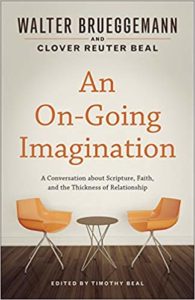 An On-Going Imagination: A Conversation about Scripture, Faith, and the Thickness of Relationship Walter Brueggemann and Clover Reuter Beal (WJK) $18.00 Okay, this is a different sort of book than the little study of the prophets listed above. This is as good as it gets, though, as an introduction to Brueggemann, as it literally is a collection of often brief, rather informal, but always rich conversations.
An On-Going Imagination: A Conversation about Scripture, Faith, and the Thickness of Relationship Walter Brueggemann and Clover Reuter Beal (WJK) $18.00 Okay, this is a different sort of book than the little study of the prophets listed above. This is as good as it gets, though, as an introduction to Brueggemann, as it literally is a collection of often brief, rather informal, but always rich conversations.
There is another book of longer, deeper interviews with him by a former student and Harvard Divinity School professor, Carolyn Sharp, called Living Countertestimony: Conversations with Walter Brueggemann (WJK; $20.00) but this brand new one is a congenial set of shorter conversations recorded (on a cell phone, often) by a Presbyterian pastor. “Pull up a chair and plan to stay awhile,” says Christine Roy Yoder, a professor at Columbia Theological Seminary. Walt here starts by telling his story, in personal, intimate conversation with a friend (and spouse of a former student, Timothy Beal, who helped pull this together.) A few of these conversations were public (such as a major conversation held at Forest Hill Presbyterian Church in Cleveland Heights, Ohio) and others were over coffee at Clover’s kitchen table.
The introduction by Clover’s husband, Timothy, telling of how he tried to mimic Walt’s legendary teaching style, drawing from his copious notes on Samuel from his seminary days, is fantastic. (Come on, some of you, you’ve swaggered and shouted and whispered with Brueggemann affectation, sometimes haven’t you?) My, my, that is a beautiful, fun, and exceptionally wise chapter. It is followed by two other great introductions, by both Walt and Clover, both telling why they have valued these dialogical sessions and how we readers can enter the lively conversations. These three early chapters are worth the price of the book, right there!
An On-going Conversation asks foundational questions – what is the Bible? How can we develop an “alternative literalism” by “losing our Bible baggage.” Why does it matter today? What is the purpose of prayer? How can we best describe the attributes and character of God? They explore some familiar ground for Walt – what is the importance of lament and attending to our pain? Why is keeping the Sabbath important (and why is it counter-cultural?) What methods of Bible study and exploration are most fruitful and faithful –how do we better appreciate the rhetoric of the Bible and preach it with imagination? And why is it so strange, and what is good about that? How does the social analysis of the Biblical writers help us navigate our own socio-political issues? What does it mean to approach creation-care and science with a spirit of doxology? What should church renewal look like?
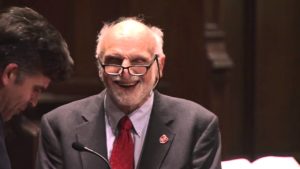 You are going to be enriched by reading this, whether you are a long-time Brueggy fan or new to his work. You’ll like hearing about his early experiences at church camps and his “personal-theological” work. There are brief chapters (again, in dialogue/conversational format) about a theology of sin, about “Eucharistic empowerment” and a chapter called “Liturgy Versus Empire” which is on the elements of worship. They talk about public prayer and about private prayer, they explore neighborliness and talk about money and possessions and so much more. Clover asks him “what keeps you going” and what he believes in. This truly is an on-going conversation and we highly recommend joining an on-going conversation by nurturing an on-going imagination.”
You are going to be enriched by reading this, whether you are a long-time Brueggy fan or new to his work. You’ll like hearing about his early experiences at church camps and his “personal-theological” work. There are brief chapters (again, in dialogue/conversational format) about a theology of sin, about “Eucharistic empowerment” and a chapter called “Liturgy Versus Empire” which is on the elements of worship. They talk about public prayer and about private prayer, they explore neighborliness and talk about money and possessions and so much more. Clover asks him “what keeps you going” and what he believes in. This truly is an on-going conversation and we highly recommend joining an on-going conversation by nurturing an on-going imagination.”
An On-Going Imagination: A Conversation about Scripture, Faith, and the Thickness of Relationship by Walter Brueggemann & Clover Reuter Beal (published by WJK) for $18.00. On sale now for 20% off, which makes it just $14.40.
For what it’s worth, here is a lovely interview with Brueggemann about his scholarship created by the publisher Wipf & Stock, who has done a number of short collections of Brueggemann essays.
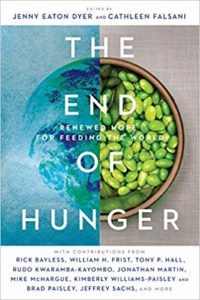 The End of Hunger: Renewed Hope for Feeding the World edited by Jenny Eaton Dyer & Cathleen Falsani (IVP) $17.00 You may recall that a few weeks ago I suggested two recent books on hunger – one by Bread for the World founder Art Simon called Silence Can Kill: Speaking Up to End Hunger and Make Our Economy Work for Everyone (Eerdmans; $29.99) and another by Texas Anti-Hunger Initiative leader, Jeremy Everett entitled I Was Hungry: Cultivating Common Ground to End an American Crisis (Brazos Press $16.99.) As I said there, both are splendid. They are still on sale for 20% off the shown prices.
The End of Hunger: Renewed Hope for Feeding the World edited by Jenny Eaton Dyer & Cathleen Falsani (IVP) $17.00 You may recall that a few weeks ago I suggested two recent books on hunger – one by Bread for the World founder Art Simon called Silence Can Kill: Speaking Up to End Hunger and Make Our Economy Work for Everyone (Eerdmans; $29.99) and another by Texas Anti-Hunger Initiative leader, Jeremy Everett entitled I Was Hungry: Cultivating Common Ground to End an American Crisis (Brazos Press $16.99.) As I said there, both are splendid. They are still on sale for 20% off the shown prices.
If only we had then the brand, brand new The End of Hunger edited by Dyer & Falsani. What a perfect supplement to those books this great one would be. It has a great cover, a fabulously curious array of contributors, and covers all sorts of ground. Please listen to me on this: this may be the best primer on world hunger and poverty issues I’ve ever seen – and I have seen a lot. The End of Hunger has stories, reports, agricultural stuff, economic wisdom, Bible explorations, practical suggestions, imaginative dreams, first-hand testimonials (from coffee growers and refugees, Africans and Asians, adopted children and rising leaders from the global South.) This book never gets dry, the chapters are short but remarkably well informed and moves deftly from the good news of what is working, the ways we can be involved, encouraging our involvement in the most effective sort of charities, helping with wise and fruitful philanthropy, and taking up the citizenship vocation of advocacy about just policy proposals, all in upbeat prose, vibrant and passionate and good. The End of Hunger is a great book!
You might be surprised by the varied sorts of topics covered and those who have written short pieces for this great collection. You’ll read a piece by Chef Rick Bayless and learn about brain studies from “Science Mike” McHargue. Heroic politicians like William Frist, Diane Black, and Tony Hall are here as are long-time anti-poverty workers. Inspiring stories come from Tony Campolo and Gabe Salguero and Ron Sider, with a great chapter on eating and cooking by Rachel Marie Stone (who, by the way, edited the latest, updated edition of the classic More-With-Less Cookbook.) I loved the chapter “From the Garden to the Table” by Amy Grant and was surprised how fantastic the piece on raising dignity was, co-written by Kimberly-Williams-Paisley and her country music star husband, Brad Paisley. From Bob Corker to Sammy Rodriguez, from the great writer Cathleen Falsani (whose chapter is called “A Thousand Days and a Million Questions”) to ONE campaign leader Rudo Kwaramba-Kayombo, this book just has so much. There’s a piece about sexual trafficking by Nikole Lim and a lovely one called “Hunger, Fasting, and Faith” by Angel F. Mendez Montoya. There is a piece on holistic health. Of course there’s a piece by Jeffrey Sachs and we’re glad to see Bread for the World’s David Beckman, right next to Steve and Debbie Taylor interviewing their own daughter Sarah, adopted from Africa. It is arranged coherently in four sections but my point is that there are diverse approaches and lots of interesting writing, making this a must read for those interested in feeding the world and a great one to give to someone who hasn’t read on this topic yet.
Again, you get the point: unlike some heady and dense tomes on this complex topic, EoH is a great, upbeat reader with stuff about the role of women and children, farming and fasting, what needs to be done and what we can do. The remarkable news is that in the last generation or so we have nearly halved the number of starving people and halved the number dying from HIV/AIDS. We are on track, moving in the right direction regarding public health and sustainable solutions, it seems. With blurbs on the back from authors as wise as Norman Wirzba and as exciting as Jo Saxton, you can be assured that this book will help us, truly, effectively, faithfully, respond to the clear command of Jesus to feed the hungry. It is possible. We can do this. With the pastors and scholars and artists and activists and politicians and charitable organization leaders in this book (even without Bono, who only gets an allusive shout out from his friend Cathleen Falsani) is fantastic. It will inform you, inspire you, equip you to do this gospel work.
The End of Hunger: Renewed Hope for Feeding the World edited by Jenny Eaton Dyer and Cathleen Falsani regularly sells for $17.00 in a very well designed paperback. At our BookNotes discount of 20% off we can send it out for $13.60 plus shipping, which, if we use media mail, is cheap. Kudos to IVP for caring about this, for working with these two women who put together this surprising volume, this labor of love. Let’s be sure there’s a copy in every church library, used at every Christian college and para-church ministry and nonprofit, in your congregation, your home and ours.
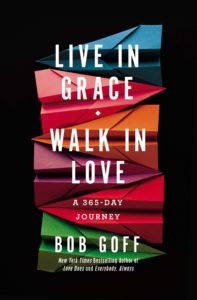 Live in Grace, Walk in Love: A 365-Day Journey Bob Goff (Thomas Nelson) $16.99 We gave a quick shout out about this a while ago and have some pre-orders that will go out Monday. The book “drops” – as they sometimes say – on Tuesday and we are thrilled. Bob is a friend and supporter (is there anybody he meets he doesn’t befriend and encourage?) As you know from Love Does and Everybody Always he is a consummate storyteller, a funny guy who lives in whimsy, and whose adventures – holy capers – are designed to create a better world of love and grace. From offering balloons to the sick to starting a girl’s school in the face of the Taliban in Afghanistan, how does he do it? Bob truly is one of the most unforgettable people we’ve ever met and his energy and cheer befuddles me.
Live in Grace, Walk in Love: A 365-Day Journey Bob Goff (Thomas Nelson) $16.99 We gave a quick shout out about this a while ago and have some pre-orders that will go out Monday. The book “drops” – as they sometimes say – on Tuesday and we are thrilled. Bob is a friend and supporter (is there anybody he meets he doesn’t befriend and encourage?) As you know from Love Does and Everybody Always he is a consummate storyteller, a funny guy who lives in whimsy, and whose adventures – holy capers – are designed to create a better world of love and grace. From offering balloons to the sick to starting a girl’s school in the face of the Taliban in Afghanistan, how does he do it? Bob truly is one of the most unforgettable people we’ve ever met and his energy and cheer befuddles me.
 He joked with me the last time we were together that he had thought he might get out of this (with a bit of tongue in cheek and faux bluster, I’m sure) book contract by writing just 30 days of devotions for a nice month-long reader. Oh no, no way! The publisher was not having it – they wanted a full-on 365-day reader of all new content. Stories, Bible studies, inspirational faith-building lessons? Yep, all of the above. An entire year’s worth. Bob Goff has a storehouse of adventures to draw upon and as an old Young Life guy, knows how to re-tell a Bible episode like the best of ‘em. Live in Grace, Walk in Love is going to be a great, great devotional. It releases this week and we have it at 20% off.
He joked with me the last time we were together that he had thought he might get out of this (with a bit of tongue in cheek and faux bluster, I’m sure) book contract by writing just 30 days of devotions for a nice month-long reader. Oh no, no way! The publisher was not having it – they wanted a full-on 365-day reader of all new content. Stories, Bible studies, inspirational faith-building lessons? Yep, all of the above. An entire year’s worth. Bob Goff has a storehouse of adventures to draw upon and as an old Young Life guy, knows how to re-tell a Bible episode like the best of ‘em. Live in Grace, Walk in Love is going to be a great, great devotional. It releases this week and we have it at 20% off.
(By the way, he’s no Yankees fan. He made a deal with a woman dying of cancer — it’s a long story you can read for in his book –and now has to wear the cap for the rest of his life. Ha!)
As if that doesn’t clue you in to his zany care, for those that may not be familiar with Bob’s extraordinary style, I want to note just two quick things. He’s no theologian (but sure is smart; he does have a law degree and is pretty darn successful in that field.) But he does know the Bible. Some think he’s just all joy and balloons and smiles, but he quotes the Bible all the time. He just does. So don’t underestimate the Scriptural warrant of his dreams and visions of making the world a better place.
 Secondly, as I’ve said, Goff does have a blast doing the unexpected, living well in gracious, good ways. That is, this new, yearlong reader could inspire those who are bored, those who are dreamless, those who can’t see that faith or spirituality might be real or exciting. Live in Grace, Walk in Love will be for many un-churched folks, I suspect, the best invitation to the Christ-promised “abundant life” that they’ve ever encountered. Buy it for the young and the old, the faithful and the faithless, the light-hearted and the too serious.
Secondly, as I’ve said, Goff does have a blast doing the unexpected, living well in gracious, good ways. That is, this new, yearlong reader could inspire those who are bored, those who are dreamless, those who can’t see that faith or spirituality might be real or exciting. Live in Grace, Walk in Love will be for many un-churched folks, I suspect, the best invitation to the Christ-promised “abundant life” that they’ve ever encountered. Buy it for the young and the old, the faithful and the faithless, the light-hearted and the too serious.
Give it to those who are, in the words of Canadian singer Bruce Cockburn,
The numb and confused
The battered and bruised
The counters of cost
And the star-crossed.
Live in Grace, Walk in Love: A 365-Day Journey by Bob Goff is a handsome hardback which regularly sells for $16.99. At our 20% off it is just $13.59 and we can send it out today.
BookNotes

SPECIAL
DISCOUNT
20% OFF
ANY BOOK MENTIONED
+++
order here
this takes you to the secure Hearts & Minds order form page
just tell us what you want
inquire here
if you have questions or need more information
just ask us what you want to know
Hearts & Minds 234 East Main Street Dallastown PA 17313
read@heartsandmindsbooks.com
717-246-3333
